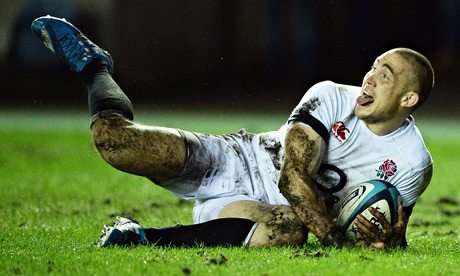
Try-scoring full-backs are among rugby union's most valuable assets. From Serge Blanco and Andy Irvine to the modern breed of Israel Folau and Israel Dagg, there is no finer sight than a top-class No15 bursting upfield from deep, creating a rising sense of defensive panic with each stride. Folau scored a record-equalling 10 tries in 15 Tests in his debut season for Australia last year; Dagg has been the silken-handed provider behind many of New Zealand's best scores in 2013.
Which brings us to England's Mike Brown. He is not called Israel and, until recently, was still without an entry visa to the promised land of the international in-goal area. Prior to this month he had been capped 21 times without registering a single point for his country. Both he and England needed something to change. Now, suddenly, tries in the first two Six Nations games have brought an overdue sense of release.
The burning question, even for those who have long admired the 28-year-old's tenacity, bravery and competitive edge, is what happens next? Is this proof that England have finally located a genuine collective cutting edge? Is Brown finally exerting the all-round influence at this level he has had for years at Harlequins? If the answers are yes, the remainder of the championship, not to mention the rest of England's year, will be fascinating.
Brown, for one, has had quite enough of being pigeon-holed as a gallant trier who is less effective in the opposition's 22 than in his own. "I want to stamp the way I play the game on the pitch and back myself that I can be as good as these guys, if not better," he says firmly. He does, even so, admit to poring over videos of Dagg and Leigh Halfpenny, determined to find new ways of improving as an international No15 beyond his regular sessions with specialist speed coach Margot Wells.
"I have been looking at the way Dagg steps in at first receiver on a two-sided attack, which is what we've worked hard on recently. After the Lions tour we also looked at the way [Leigh] Halfpenny defended; that's what we're trying to get our full-backs doing as well. It's good to look at them and see how you can improve, but you also need to focus on yourself and what you bring to the game."
There were glimpses of the English back-line beginning to flower in Paris and Edinburgh, despite the poor Murrayfield pitch and the virus which caused Brown some discomfort in the buildup. Stuart Lancaster, the head coach, and his lieutenants, Andy Farrell and Mike Catt, have spent many painstaking hours developing the depth and shape of their team's attacking structure, with the entire back three heavily involved.
England, says Brown, knew they could not plod along as they had been. "We were all disappointed with the way our attack had been going but we've worked hard on it and you can really see it's getting a lot better. We've started to off-load and play with high tempo which is great for someone like me who wants to play that way, as well as the other back-three players."
Dotting down tries himself is merely a pleasant bonus, although his 45 tries in 149 Premiership appearances compares extremely well with Alex Goode's total of 11 in 100 league games for Saracens and Ben Foden's 31 in 134 league appearances for Northampton.
Since his earliest days at Salisbury RFC, the club which has also produced two Richard Hills, Dave Egerton, the Scotland fly-half Tom Heathcote and London Irish's Tom Homer, what has always mattered most of all is winning, regardless of the jersey he is wearing. His spiky on-field persona may also reflect the struggles he has endured off it, from his parents' separation when he was 12 to his father's ongoing battle with multiple sclerosis, but at heart he has never changed. Losing hurts him deeply, at Test level or otherwise. "Whenever you lose it's a bad memory, a scar you want to put right.
"I just hate losing, so losing anywhere is not right. I do enjoy the wins, obviously, but losing hurts a lot. Like the France game ... it was massively frustrating to lose in the way we did. Things like that niggle away at you. It's about how you react to those losses that defines you as a team. As long as we keep reacting in a positive way, hopefully there won't be too many of them."
It explains why he is more inclined "to look at the little mistakes you make before you look at the good stuff you did". It has also enabled him to ignore knocks or illnesses which would floor others, as was the case last weekend. "It wasn't too bad before the game, although I didn't sleep too great. It was worse at half-time ... trying to get going for the second half was tough. My legs were quite stiff, my back was stiffening up and feeling sensitive and my hips were hurting quite a bit. But I wouldn't have not gone out, I wanted to carry on."
Such mental steel is not reflected on a stat-sheet but his team-mates have long appreciated it. Heading to Twickenham in the coming weeks will be the Lions' full-backs Rob Kearney and Halfpenny, as good in certain aspects of the game as any full-back their countries have ever produced. Neither Ireland or Wales, even so, will be taking the in-form Brown lightly.

